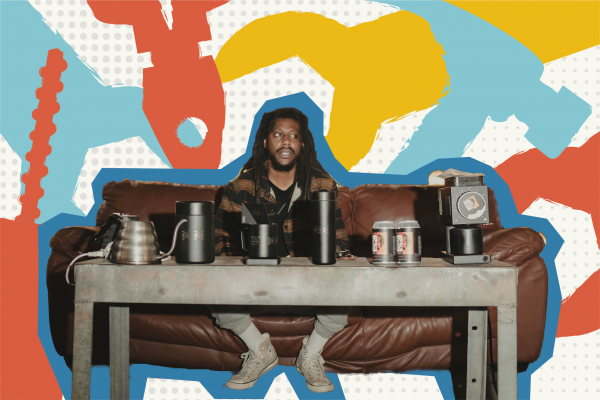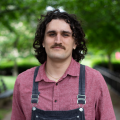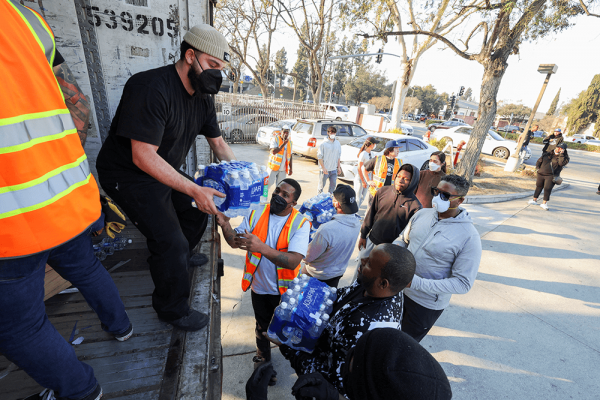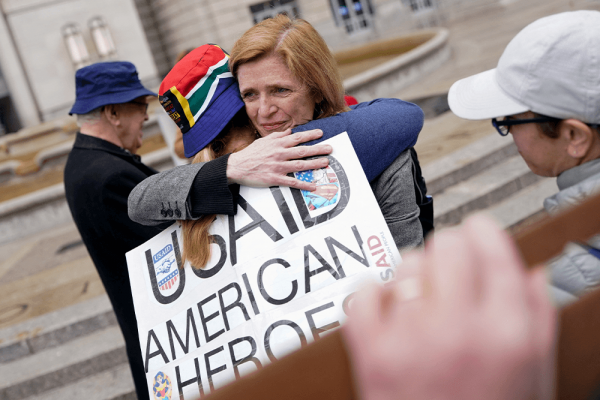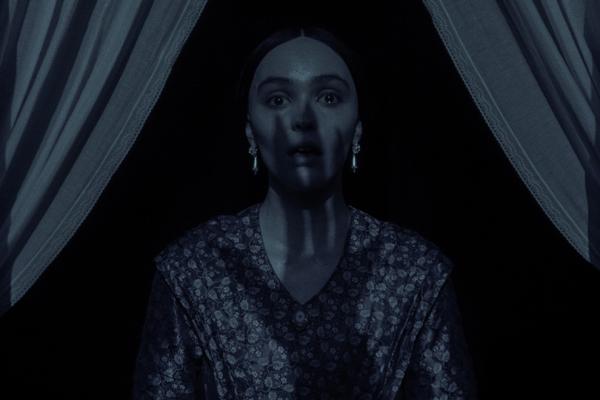This interview is part of The Reconstruct, a weekly newsletter from Sojourners. In a world where so much needs to change, Mitchell Atencio and Josiah R. Daniels interview people who have faith in a new future and are working toward repair. Subscribe here.
Every few months, a headline flashes across my news feed: “Climate change could destroy the coffee industry,” or something similar.
Even as a regular coffee drinker, what concerns me isn’t the change to my morning cup, it’s the lives and livelihoods of the farmers who plant, grow, cultivate, and prepare my coffee beans. The majority of coffee is grown in the global South, which is also bearing the brunt of climate change. Meanwhile, a majority of the world’s carbon dioxide emissions also come from the global North.
Climate change isn’t the only justice concern when it comes to coffee. The production of coffee is full of economic exploitation. And despite coffee’s origins in Ethiopia, specialty coffee is better known for whiteness and wealth. It’s no accident that a new coffee shop is stereotypically the first sign of gentrification. But what if that could change?
Jason Petty, better known by his artist name “Propaganda,” is working toward a more just coffee future. Propaganda is a multi-decade poet and rapper, a legendary figure in Christian hip-hop, he teaches politics and explores theology on podcasts, and in the last several years, he has taken coffee from habit to business.
He launched Terraform Cold Brew, a project that coincides with his poetry and music, has collaborated with Onyx Coffee Lab and Bridge City Coffee, and is a brand ambassador for the drinkware company MiiR. He also tries to be a “liaison and a connector among Black and brown people in coffee to help meet each other and amplify their voices.”
In our interview, we spoke about gentrification, the sacredness of soil, how coffee’s origins have influenced his poetry and music, and why you should probably try popcorn with your coffee.
This interview has been edited for length and clarity.
Mitchell Atencio, Sojourners: How did coffee become a hobby for you, and when did it turn into a business?
Jason “Propaganda” Petty: It started with touring. When you discover there is an actual difference in the coffee you’re getting at a gas station versus this cool shop — and we were just looking for WiFi before the show — you start noticing the difference.
I got kicked into high gear once I learned that [coffee] was discovered in Ethiopia and it’s only natural to East Africa. Every other [coffee bean] is propagated from there. I was like, “Oh, now it’s a justice thing.” Because you start looking around and you’re like, “Man, for a product that can only grow at the equator, only natural to Africa, there aren’t a lot of people from the equator or natural to Africa in [coffee] spaces!”
(Coffee cultivation happens primarily along the “coffee belt” or “bean belt” near the equator.)
[At the time], there weren’t a lot of people involved in hip-hop that were involved in specialty coffee, so let’s start a company. That company was Left Roasters.
You preempted one of my questions: When people think of specialty coffee they think of whiteness and gentrification, hipsters, and all that stuff. How did you connect coffee’s African origins to modern-day coffee drinking and roasting?
I honestly feel like I came across that little nugget on accident. [Coffee] didn’t go from Africa to Europe. It went from Africa to Turkey to Europe. Europeans thought it was Muslim. They were tea drinkers and [said], “This product is of the devil.” It felt like such a parallel to almost everything else [Black and brown people] make, whether it’s our music, style of dress, or anything that we do. It is first rejected, then embraced and gentrified.
In my heart, I felt we were early enough in the so-called “third-wave coffee” to actually change this narrative and trajectory.
It was early enough to where we could start saying, “Let’s talk justice and equity.” It felt exciting, like a mission. I know I’m not the only one that noticed this. I just happened to be, as far as [American] hip-hop was concerned, one of the earlier adapters to what specialty coffee could be if it was in Black and brown hands.
You have spent time learning what coffee means culturally in its original contexts. How has that, and your trips overseas, been a part of the mission for you?
[My] trip to Ethiopia really sealed the deal [for seeing coffee] as a stand in for our culture.
First of all, you can follow the journey of coffee: It goes right along the transatlantic slave trade, coming into Central and South America, then up to [North] America — it followed us. [Then] you find these farms — whether Indigenous families in Honduras or Ethiopia — these little coffee plots have been passed down multiple generations.
In certain parts of Ethiopia, if I offer you in for tea, it’s because I’m being polite. I really don’t want to talk to you, and tea is very fast. But if I offer you in for coffee, that’s going to take an hour, because I’m going to roast it, I’m going to pass around the roast for you to smell it, I’m going to grind it, we’re going to brew it, and we’re going to sip it all. That’s an hour process ’cause it’s all done by hand. So, that means I want to know more about you; I want to talk; I want to bond; I want to connect. Coffee is something that — by the very nature of what it takes to make it and to grow it — commands us to be in community.
[There’s also] sort of a relationship with the soil, the fact that coffee is a family thing, communal in nature. You don’t go have a cup of coffee; we get coffee. We sit down and have a coffee ceremony.
How did all of this change your coffee habits? Did you buy differently? Did you slow down when you had a cup of coffee?
Yeah, you learn the difference between fair trade and direct trade. Fair trade is basically a market value of whatever that [coffee] cherry or bean is per pound or per kilo. But that’s set by the council in Germany. Germany don’t grow coffee, so why do they get to set the price?
The farmers live at the equator, experiencing all the effects of climate change. They’re not causing it; it’s us in the global North causing it. So why do we get to set the price?
Direct trade, it’s like the farmer gets to tell us the price. [Companies] pay the farmer directly and farmers set the price. [There are other benefits of] knowing who you’re working with, being able to go the origin, knowing the actual farmer and importer’s relationship, how [coffee trade] is affecting their community, knowing the mechanism of its roast, knowing the stateside practices with storage, price, and crop.
There are some [coffee] processes that are in demand here — like honey process — that the bigger, corporate farms can pull off, but the African and Brazilian places, small family plots, they’re doing this by hand and by feet. They’re getting burnt and getting acid on their feet. So, I won’t buy that process because I know it’s causing damage to the growers.
As far as drinking coffee: I can’t front man. I already had my own ritual around sipping slow and enjoying the coffee [before my trips]. But! The reality of coffee is that if a farm is able to produce 1,000 kilos of coffee cherry, “specialty coffee” is only the [coffee graded at] 82 percent. At the best possible situation that’s [about] 20 percent of your crop. The rest of it, you either throw it away, drink it at home, or sell the rest as bulk on the stock trade — the Folgers and 7-Eleven stuff. That’s why a lot of farmers don’t drink the highest-grade coffee — they sell that. So, you know, even drinking “low-grade” coffee is helping the farmers, because they gotta sell that too.
If I’m a reader who learns all of this and doesn’t want to drink coffee that harms the farmers, and I want to drink direct trade, where do you start to ensure you’re doing that?
There’s this app called Bext360. Essentially what they do is end-to-end blockchain [tracing]. You can track the bean from the crop to your cup, and you can look at the app to see what the farmer got paid, what percentage of it went to them. I saw it with my own eyes in Honduras, when you buy the bag, there’s a QR code. It’ll show you exactly where everything is. That’s where the industry is going.
You were talking earlier about climate change. Did you see the effects of climate change on your trips?
The dudes down in Colombia at this place called La Palma y El Tucán, they have this side project called the “Soil Revolution Fund.” They bought this plot of farmland that, [in 2011], was just dead. Grass wouldn’t grow. No vegetation. It was a monocrop. It was dead. Now? It looks like a tropical rainforest. It is the most beautiful, lush [place]. My music video for the song “Soil Is Sacred” is shot there.
I learned from them that, as it stood in 2021, as far as the topsoil around the world, we have about 27 harvests left for us to grow actual coffee. Twenty-seven. And then coffee can’t grow anymore. That’s how dire the situation [of climate change] is. Our children’s coffee will be genetically modified in labs or grown indoors if we stay on the path we’re on.
Part of what they did was take steps to mitigate those effects. Not growing monocrops. They grow plantains, avocado, mango; they’re growing all kinds of other stuff there because that’s what the ground is supposed to do. Their pesticides are chickens, and their fertilizer is chickens and burros. Everything is a closed eco-system; the earth just does what it does.
I remember being at the Color of Coffee Collective in Houston, and the same question was asked of these Kenyan farmers about climate change: What are they doing to adjust or to mitigate it? They were like, “We’re a third-world country. We’re not causing climate change. What are you doing to mitigate climate change? You’re the industrial nations!”
Has what you learned about coffee affected the rest of your purchasing habits?
The more you realize it really does truly start with the soil, and this might be somebody’s family plot, [the less you rush]. This is so labor intensive. [Terraform Cold Brew] bought these beans in February, and we’re not going to get them until September.
I can’t do shots of tequila now. Like, bro, it took three years to make this! Sip it slow, fam. I consume a lot slower, but at the same time, in some sense, this is made to be consumed. These farmers are businessmen. Don’t be precious; don’t treat them as exotic. They’re trying to make their money! So, nah, buy the bottle, get two bottles! I have a hard time shooting tequila knowing it took years to grow, but that man growing it wants us to buy another bottle and shoot as much as we want.
I want to see [growers] not as a pet project, but as co-laborers.
What I hear you saying is: Whether we like it or not, coffee is a community process, and it can be exploitative or it can be healthy, but it’s up to us on the richer end of the spectrum to try to influence that.
You absolutely think more about the supply chain [when] you see it. When you’re purchasing clothes online, there’s an exploitative process somewhere in there. And it sucks. The tension of knowing that, to live and exist in the modern world, someone’s getting exploited.
And then it sucks’ cause it’s the tension of knowing that to live, to exist in the modern world that we’re in now, the way that the world is built, someone’s getting exploited.
I don’t typically ask this in Q&As, but what am I not thinking about when I think about coffee and justice? What am I missing?
There’s a future where your experience with coffee in the physical space of a coffee shop and the experience at home are curated by the people, or the descendants of people, from spaces [where coffee originated]. So, curated legitimately by Black and brown faces.
[Most Americans] have only seen coffee through the lens of American or European hands. Across the country, the coffee experience is being curated by people of the diaspora. It still blows my mind that no coffee shops [in the U.S.] have popcorn. That’s what you have in Ethiopia. You pop popcorn and have coffee. That’s been done for centuries.
I’d love to [imagine] an experience of coffee that’s truer to its roots and isn’t extractive. And that doesn’t mean everybody’s not welcome. Because the Nordic nations came up with light roast. And I’m like, thank you, ’cause I love light roast. [A coffee experience true to its roots] just means we have a table that values its origins.
Got something to say about what you're reading? We value your feedback!
